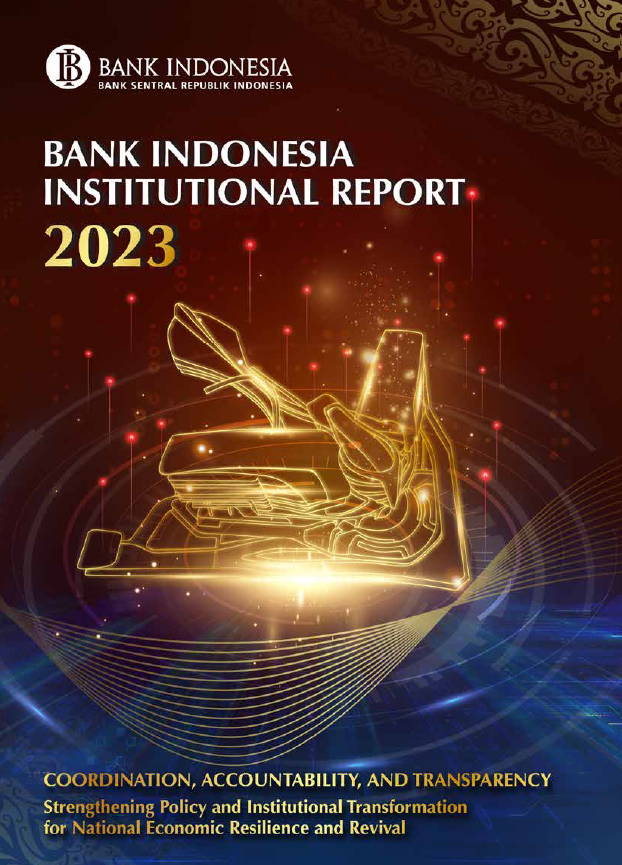 Economic Outlook and Challenges
Economic Outlook and Challenges
Global economic dynamics in 2023 were susceptible to rapid change, accompanied by elevated uncertainty. After recording solid 3.5% growth in 2022, global economic growth in 2023 retreated to 3.1% with further moderation to 3.0% projected in 2024. Global economic performance in 2023 was also characterised by divergence between advanced economies, particularly the high growth recorded in the United States (US), and emerging markets and developing economies (EMDEs), which succumbed to lower growth and stagnation. In terms of EMDEs, Chinese growth moderated on the back of weak consumption and deteriorating property sector performance, contrasting maintained economic performance in India and ASEAN-5.
At home, the domestic economy maintained solid growth in 2023 along with resilience against the impact of global spillovers and persistently high uncertainty. Indonesia's economy in 2023 recorded 5.05% (yoy) growth on the back of exports, building investment and the favourable impact of the general election. Solid private consumption was driven by high consumer confidence, maintained public purchasing power and fiscal stimuli, which included the provision of subsidies and various social assistance programs. Investment also performed well given the ongoing completion of national strategic projects (PSN) and non-building investment. Spatially, the national economy was supported by solid economic growth in nearly all regions of the Indonesian archipelago. Economic growth is projected to accelerate to reach 4.7-5.5% in 2024.
Bank Indonesia Policy Response
The Bank Indonesia policy mix response was key to resilient economic performance in Indonesia. The scope of the Bank Indonesia policy mix in 2023 covered 5 (five) important aspects, namely: (i) fiscal and monetary coordination, (ii) accelerating financial sector transformation, (iii) accelerating real sector transformation, (iv) economic and financial digitalisation, and (v) the green and inclusive economy and finance. The policy rate was set at each monthly Board of Governors Meeting (RDG) as a forward-looking and pre-emptive measure directing inflation forecasts for the upcoming two years within the target corridor. In 2023, Bank Indonesia raised the policy rate in January and October by 25bps each time, which was then held at 6% until yearend. This decision was consistent with the pro-stability focus of monetary policy, namely to safeguard rupiah stability against the impact of high global uncertainty and as a pre-emptive and forward-looking measure to mitigate imported inflation, thereby maintaining headline inflation within the 3.0%±1% target in 2023 and 2.5%±1% target in 2024 and 2025.
Bank Indonesia continued strengthening coordination with the Government to control inflation and maintain the external resilience of the national economy. Managing inflation, close coordination between Bank Indonesia through monetary policy by raising interest rates and stabilising the rupiah was implemented with the Government through fiscal policies to disburse energy subsidies and social assistance, thereby minimising the impact of the upward global oil price on domestic inflation. Bank Indonesia also coordinated in synergy with the Government within the Central Government and Regional Government Inflation Control Teams (TPIP and TPID) to strengthen the National Movement for Food Inflation Control (GNPIP) at head office and 46 BI representative offices throughout Indonesia. Bank Indonesia also provided support through the operation of affordable markets, food security, interregional cooperation, food distribution, data digitalisation as well as massive ongoing campaigns. Meanwhile, coordination to maintain domestic financial market stability against the impact of global turmoil was achieved through BI monetary operations for policy rate effectiveness and rupiah stability, while the Ministry of Finance also issued domestic and global Government Securities (SBN) to fund the fiscal deficit within the State Revenue and Expenditure Budget (APBN). Coordination was implemented during the planning stage at the beginning of the year, during the auctions and in terms of monitoring.
Bank Indonesia Transformation
In accordance with the mandate of the P2SK Act, Bank Indonesia in 2023 continued implementing and strengthening its transformation agenda to establish and maintain a credible, professional, accountable and transparent central bank based on good governance. In the policy area, transformation aimed to refine the Bank Indonesia Policy Mix (BKBI) framework that integrates monetary, macroprudential and payment system policies into a policymaking framework, underpinned by various supporting policies. Institutionally, transformation focused on 3 (three) strategic areas that encompassed the organisation and work processes, human resources and work culture as well as digital aspects. First, strengthening the BI policy and institutional governance system based on the principles of independence, consistency, coordination, accountability and transparency. Second, strengthening the policy framework by streamlining digital-based business processes and work processes as well as transforming human resources to support work processes in the digital era. Third, accelerating digital transformation for the policy and institutional work processes based on the Bank Indonesia Digital Innovation Masterplan (RIVIBI) towards the vision of becoming the foremost central bank.
Bank Indonesia Performance Milestones
Performance excellence in 2023 was achieved at Bank Indonesia in line with the targets set. This was reflected in the realisation of key performance indicators (KPI) and budget performance, supported by stakeholder recognition as well as national and international awards. The performance milestones represent the tangible realisation of consistent policy implementation, continuous innovation and close synergy between Bank Indonesia, the Government and relevant ministries/agencies. This was also bolstered by efforts to maintain institutional credibility by honing the Bank Indonesia institutional and governance system policy mix.

